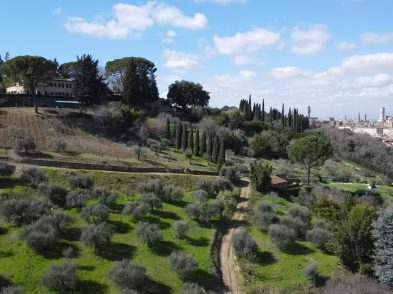Ragini Gupta has served as a US diplomat since 2002 with previous assignments in Jordan, Mexico, Pakistan and India, as well as serving as director of the Office of Broadcast Services in Washington, D.C. As of July 2020, she assumed the position of US Consul General in Florence. Ragini Gupta spoke live to The Florentine on November 20 as part of the TF Together series.
Subscribe to our YouTube channel and never miss a minute.
Helen Farrell: It’s become a tradition that we always chat with the new US Consul General. You arrived in August, in the middle of the pause between the pandemic waves. What were your first impressions of Tuscany?
Ragini Gupta: Tuscany has a very special place in my heart. The first time I came here was about 30 years ago, when I was younger and had just taken a few art history courses at the university. I was astounded by the beauty of Florence, Pisa and the Tuscan countryside, being able to see the masterpieces—masterpiece upon masterpiece—at the Uffizi, Accademia, and to really just feel the environment, the ambience of the Renaissance in every street and corner. It was an experience I never forgot and to be able to come back here as US Consul General is incredibly special, a dream come true. Tuscany and Florence are every bit as beautiful, astounding and inspiring today as they were 30 years ago.
HF: During your career you’ve been overseas in various different postings: Jordan, Mexico, Pakistan and India. In what way does a posting like this in Italy differ from your prior experiences?
RG: All of my prior postings were considered “hardship assignments” for one reason or another, and obviously the assignment here in Florence is not. I view it as a gift or a reward for the time that I have served in places under some fairly challenging circumstances. Those challenging circumstances actually made the work interesting and intellectually stimulating, and I’ve enjoyed every single assignment I’ve had. I’ve been lucky to be present to see history being made. For example, in Pakistan I was managing the terrorism finance portfolio during the height of the war against terror; in Jordan I was present and witnessed both the rise and the subsequent military defeat of the Islamic State. These have been incredible opportunities, but I would say that the way in which this assignment in Italy differs most significantly from my prior assignments is the breadth and depth of the bilateral relationship between the United States and Italy, and the extent of our ties: our economic, cultural and military ties, and the incredible people-to-people connections that we have and that a publication like The Florentine supports and encourages. Being here, it’s evident that our friendship and alliance is based on shared values and mutual respect and admiration.
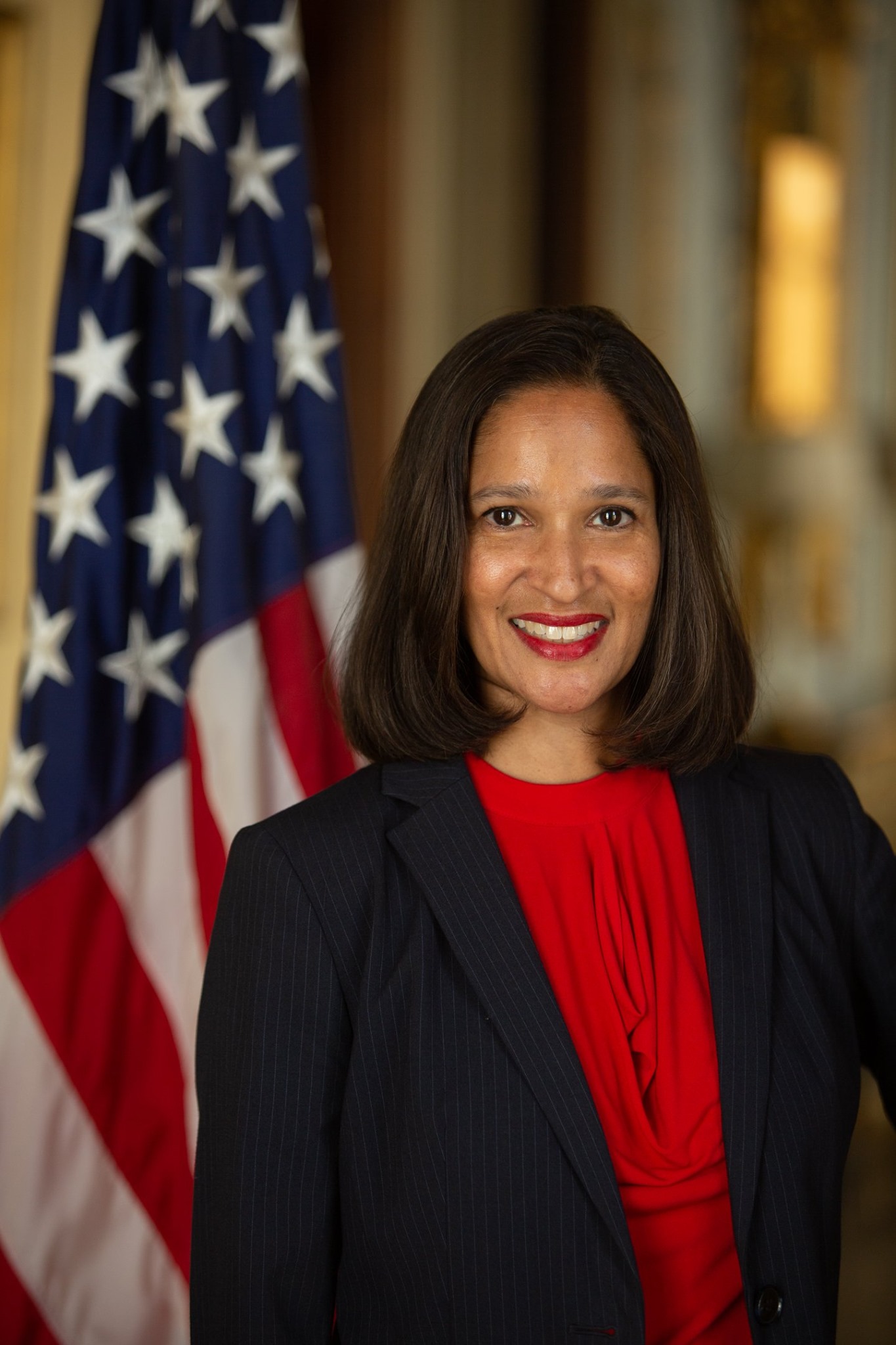
The 45th US Consul General in Florence, Ragini Gupta
HF: I couldn’t agree more with you. This is something we’re seeing more and more: the unity that’s in the international community in Florence. And not just in Italy; we’ve got all of our American readers who tune in and keep saying how much they want to come back. The ties between Italy and the United States are undeniably strong, and stronger than they’ve ever been. Your first months as Consul General have included the US election campaign of course. How does being a US diplomat during an election year face different challenges than it might do otherwise?
RG: During my career I’ve had the opportunity to be overseas for two significant presidential elections and transitions. In 2008, I was in India for the elections and witnessed from overseas the transition from President Bush to President Obama. Then in 2016, I was in Jordan and experienced the transition from President Obama to President Trump. The exciting part about being overseas for a US election is that it’s an opportunity for us to explain democracy, in particular our form of democracy, to talk about democratic values and our democratic system, warts and all! This is particularly interesting and satisfying when we’re serving overseas in a country that has a different system of governance. For example, in Jordan the King of Jordan runs the government, and I’ve been in other places that are also more nascent. One thing we don’t do is proclaim that our system is the best or that it’s perfect. But we do proudly highlight that our system is of the people, by the people, and for the people, and that through our democratic process our citizenry is able to express itself and elect a government of its choosing. It’s an exciting opportunity. In terms of being overseas for a transition, we usually don’t see radical or significant changes from one presidential administration to the other when it comes to foreign policy. There are some shifts. President Obama, for example, joined the Paris Agreement and President Trump withdrew from it. But as US diplomats, as civil servants, our job is to serve the current administration to the very best of our ability and then prepare to serve the next administration when the transition of power takes place.
HF: We’ve worked together through The Florentine to encourage overseas US citizens to vote during the elections. This struck me as one of the services that the US Consulate offers. Maybe you could tell us a bit about what the priorities of the US Consulate are in Florence and what your own goals are as the Consul General.
RG: To be frank, the current Covid situation is playing a role in dictating what our current goals and priorities are. My hope is that as soon as we see the light at the end of the Covid tunnel, and the pandemic starts casting less of a pall over our daily lives and our operations, we’ll be able to adjust and readjust our goals and priorities. But at this moment we have four main priorities: the first is that we’re safeguarding the security, health and safety of the employees here at the Consulate. That means that, like many other workplaces, we have to shift to smart working, significantly minimizing the number of people here on the compound, and we’re operating on shifts.
Notwithstanding that, however, another critical priority is the wellbeing of the American community here in our consular district. There are over 60,000 Americans who are resident in our consular district and, notwithstanding the fact that we have less of a footprint here in the Consulate, we’re still providing the full suite of services to this community. We’re processing passport applications and we’re still doing notarial work. If an American citizen needs to be repatriated under difficult circumstances we provide that assistance; if there’s an unfortunate death of an American citizen here in Italy, in our consular district, we provide the assistance that we’ve always provided. We’ve found ways to do it, so that we’re not necessarily doing it in person, but we’re still continuing to provide the full extent of services to the American community here that we’ve always provided. Unfortunately, we don’t have the two million American tourists that are usually here in any given year, the eight to twelve thousand American students that come to study and learn from this incredible environment. Obviously, we have less of a demand for some of our emergency services, but although we’re doing less because the American presence is less, we’re still able to support the community.
Another critical goal and priority is the focus on the bilateral economic relationship, particularly given the devastating impact of the pandemic on the entire global economy, the extent of which is still yet to be ascertained, and so we typically focus on promoting investment in the United States by Italian companies. Even during these challenging times, there have been significant investments announced by Italian companies in the US. We’ve had Menarini, the pharmaceutical company, and Sofidel who have announced major investments over the summer in the US. But we’re also seeing American companies continuing to invest in Italy. Just last week, UPS opened a major processing facility in Prato and Baker Hughes has just this past summer launched a new phase in their operations here. Eli Lilly is expanding. The strength of the US and Italian economic partnership remains strong, and that’s very gratifying. One of the ways that we here in the Consulate are trying to support that is, even though travel is by and large locked or limited, there are certain categories of exceptions that we’re able to process. For travelers whose travel would contribute a significant amount to the US economy, we’re able to process exceptions to the ban on travel.
I’ll just mention the last priority: all of us are experiencing this palpable and tangible loss of the American presence in the district, of the tourists and students. We’re trying to find ways to facilitate the return of this presence. What that looks like is we’re working with the American university programs to figure out what some of the obstacles are to bringing American students back next spring or next summer, and then we’re trying to use our offices to help resolve or address some of the challenges that they identify. In a nutshell, most of that is Covid related, or has a Covid angle, but the bottom line is that we’re trying to do everything we can to support the very strong bilateral relationship that the US and Italy have.
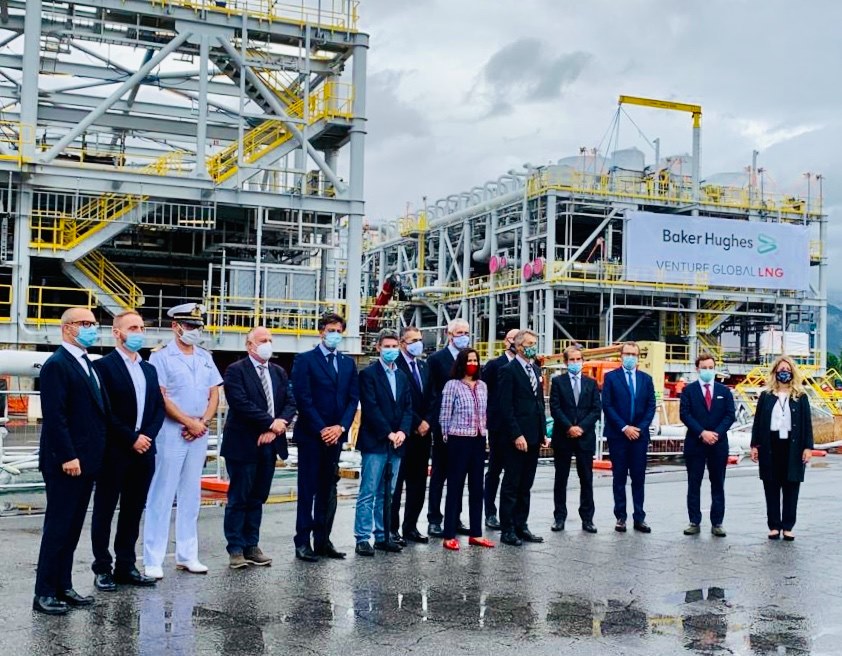
Visiting the Baker Hughes site under construction in Avenza, near Massa (Tuscany) and celebrating with executive vice president Rod Christie the completion of the first modules for the LNG terminal destined for Louisiana in the US / ph. @USCGFlorence on Facebook
HF: You’re covering a lot of ground in terms of the community. Of course, many American citizens living in Tuscany and their families have been impacted by the losses in the tourism and study abroad sectors. Does the Consulate provide direct assistance to families who have been impacted because their livelihoods have been affected?
RG: In the ways that I’ve mentioned, we do support the return of the American students, for example, which has then an impact on people’s livelihood. I’ll start off with some good news: a lot of the university programs are considering reopening for the spring. The vast majority did not open their doors in the fall, but they are considering reopening in the spring or summer. Student visas are being issued: both we here in the Consulate are issuing student visas for Italian students to travel to the United States, but the Italian Embassy in the US and Italian Consulates in the US are issuing student visas for Americans who want to come and study here. One of the things we did was to contact the Italian Embassy and obtained their guidelines, particularly with respect to student visas, and passed that information on here to the American university programs so that they could advise and inform their students.
One of the other ways in which we supported the American community over the past several months was in assisting Americans resident here to exercise that most fundamental right to vote. We used all the means at our disposal, including The Florentine, to get the word out about how Americans could submit their absentee ballots, serving as a receiving point for completed ballots and then using our diplomatic pouch to send those ballots to the United States so that the voice of the American community in this region could be heard.
Another thing we’re trying to do to prepare for the return of the American students is we’re working with the local authorities to create a social safety net for Americans who may run into trouble after a “night out on the town”. In these ways, we’re trying to work systemically to facilitate the return of the students and as many Americans as possible. Over the summer when I had first arrived, I was eating at restaurants outside and be speaking in my American accent and I recall a waiter hearing me and saying, “Oh, are the Americans back? Are they allowed to come back?” At that point, I had to be the bearer of sad news, replying that, no, I was just one and my situation and case was unique. I cannot wait for the day that we’re able to return to the normalcy and have this incredible presence back amongst us here in Tuscany.
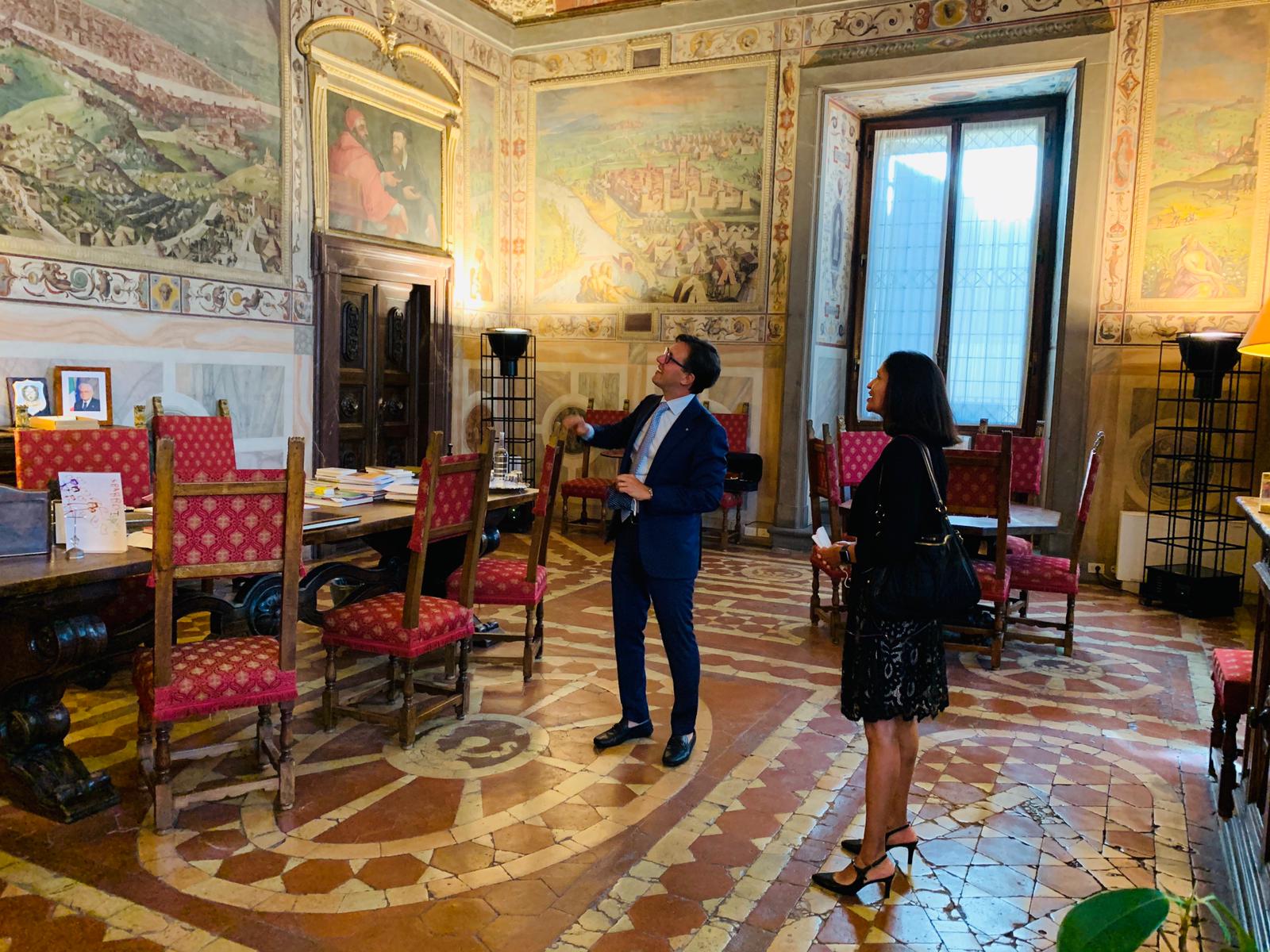
Meeting the Mayor of Florence, Dario Nardella, earlier in the year / ph. @USCGFlorence on Facebook
HF: I remember walking along the lungomare in Viareggio this summer and hearing one lone American voice, and my heart leapt for a second. I always find it fascinating to speak with diplomats and to learn about this career that takes you all over the world. In your position, what advice would you give to somebody who’s interested in pursuing the same career as you? Would you recommend it?
RG: I would recommend it 100 percent. It’s an incredible career; you are able to serve your country while living a life of adventure. I know that may sound fanciful, but it truly isn’t an exaggeration. The opportunity to learn different languages—I had six months of Italian language training before coming here; I’ve learned Arabic, Urdu and Spanish, all during the course of my diplomatic career for my assignments. At the same time, as I mentioned before, I’ve had the opportunity to witness history in the making, to be a part of that history, to play my small, small part, and so it’s a very fulfilling career. I do have one caveat, however. It’s a career that does require some measure of sacrifice. Every couple of years you have to leave the community that you’ve ensconced yourself in, the friends that you’ve made, the comfort level that you’ve achieved, and start all over, learning a new language, culture and society, and adjusting and adapting all over again. The personal adjustment isn’t usually the most challenging part. What’s really challenging, but also interesting and stimulating, is that you have to figure out how to achieve US objectives in a completely different cultural and social environment. What worked for me in Mexico—discussing water treaties over a few shots of tequila—did not work in Pakistan. What worked in Jordan doesn’t work here. Finding the way to be effective and efficient can be a real challenge.
It’s also not just a challenge for the individual diplomat; the sacrifice is also required and has to be made on the part of the family of each diplomat. I’ve been on this adventure with my two children, and when I was in Jordan then-Vice President Biden came to visit to check up on the status of the operations with respect to the war against ISIS, but he also came to the embassy and asked to have a meeting with the children of the diplomats. He thanked them for their service and sacrifice. His words were incredibly meaningful to my family and myself then and remain so to this day, because the children and family of diplomats don’t choose this life and they have to deal with the separation from family, the loss of a certain amount of stability and security in their lives. While it’s a career, I can’t imagine doing anything else. I’m happy to speak in more detail and have targeted sessions with groups or individuals who want to talk about how to become a US diplomat, and why it’s such a fascinating career, but do keep that aspect in mind: there is that element of service and sacrifice.
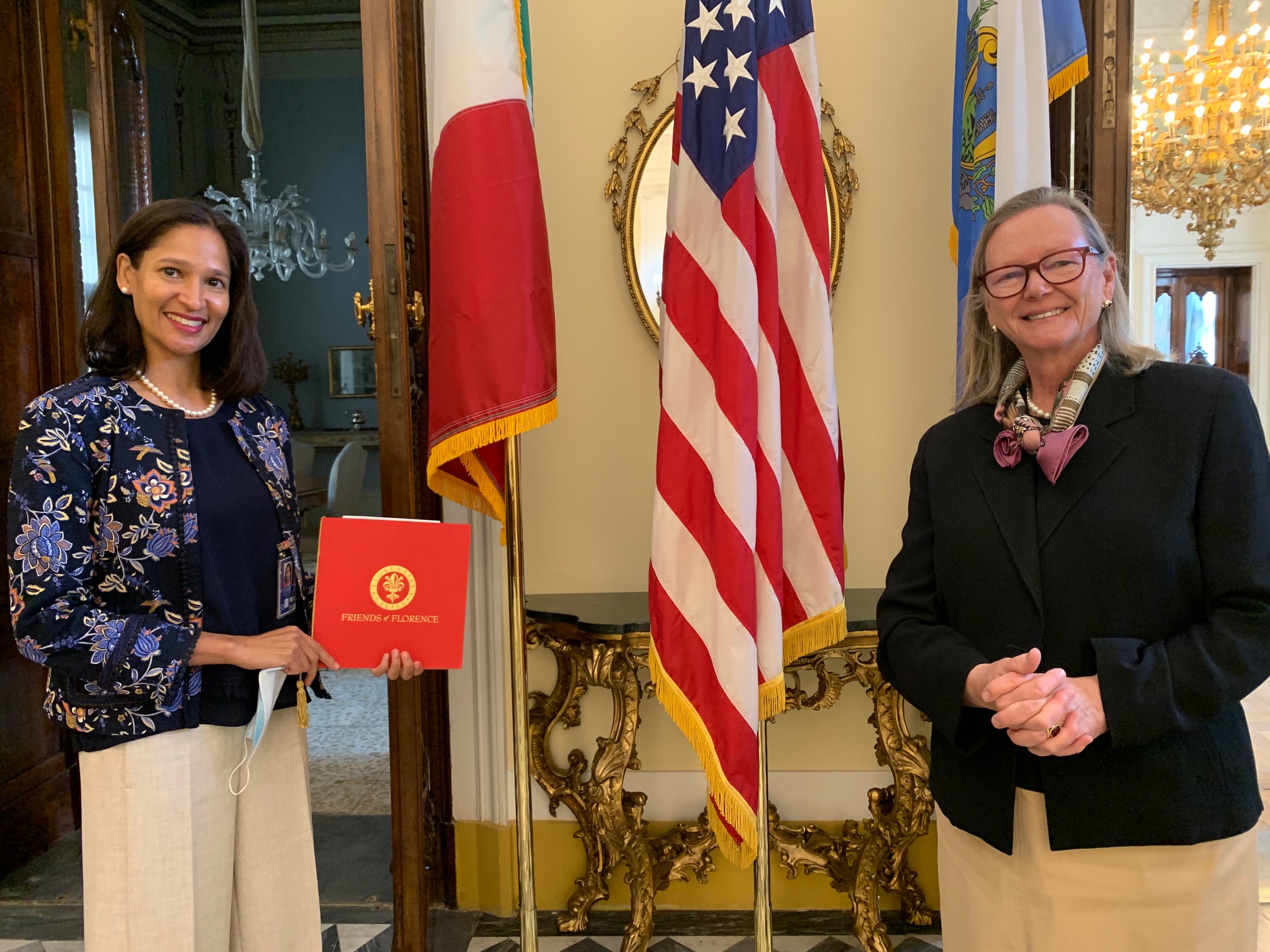
Meeting Simonetta Brandolini d’Adda, President of the Friends of Florence Foundation
HF: Which leads us nicely onto Thanksgiving. Thank you for the sacrifice you and your family make by being here and serving your country the way that you do. Does the US Consulate have plans for Thanksgiving? Would you like to deliver a Thanksgiving message for our readers?
RG: Unfortunately, this year is unprecedented in so many ways, and one of the ways that it’s different is that we’re not going to be having any significant Thanksgiving celebrations. We’re not going to be throwing open our doors and sharing this tradition that we have, that I’ve shared every Thanksgiving I’ve been overseas with friends, contacts and the local staff where I’ve served. What we did do this past week is, in order to thank our team at the Consulate, we had a socially distanced and safe Thanksgiving celebration to thank everyone here for the hard work that they’ve done throughout this crisis. We did it with two or three people coming at a time, getting their food and then going back down to their desks to eat it over the course of two days. We adapted and we found a way. My family—just the four of us—are going to have a quiet Thanksgiving meal, the quietest we’ve ever had! We’re going to do some things on our social media to highlight the event and the activities that we’re doing inside and in a more private and personal way.
In terms of a Thanksgiving message, it’s hard right now to easily come up with the things that we are and should be thankful for at this time. We’ve experienced a lot of loss recently, and particularly here in Tuscany going from yellow to orange to red in the span of just a week, but I think that that’s the challenge this year: to find and focus on the things that we are and should be thankful for. As usual, those things are friends and family and the ties that bind us, so that’s the message I’m going to be giving my own family, and I hope that it’s of use to your readers too.
Stay connected with the US Consulate in Florence on Facebook and Twitter: @USCGFlorence. See the website.



